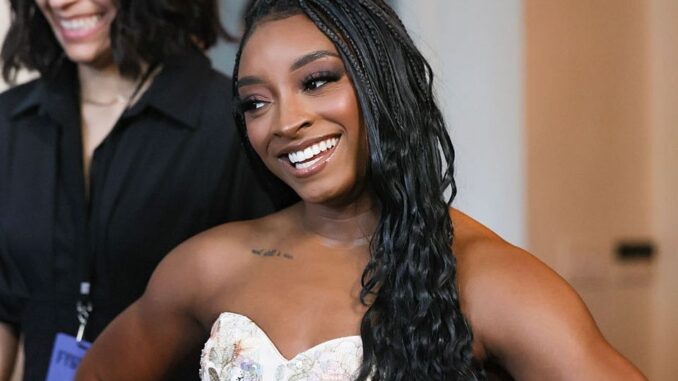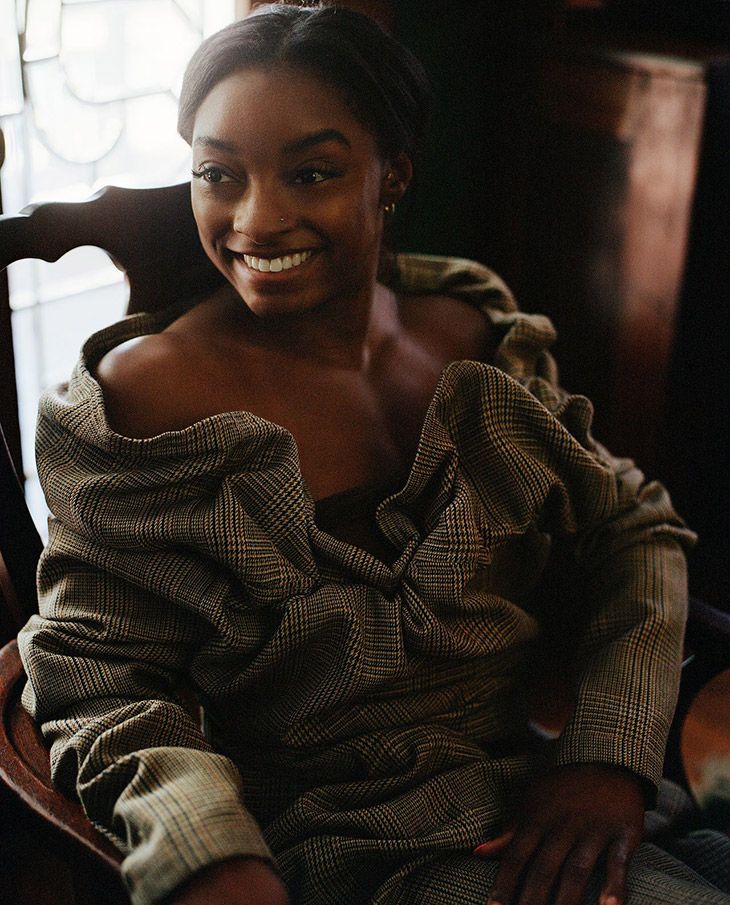
Riley Gaines continued to wage war with Simone Biles over transgender athletes, two days after the gymnast first launched her scathing attack on the conservative activist. The USA Olympic hero, 28, hit out at Gaines Friday night when she compared her to a man after the former swimmer criticized a Minnesota high school softball team for competing with a trans player.
The stinging online attack triggered a bitter social media feud between the two with Gaines, the host of OutKick’s Gaines for Girls podcast, issuing a series of rebukes. And now, the former collegiate swimmer has dug deep into the archives for her latest brutal retort.
Gaines, 25, trawled through eight years’ worth of Biles’ social media presence to unearth a 2017 post that she claims undermines the USA Olympic hero’s current stance on the gender row. ‘ahhhh good thing guys don’t compete against girls or he’d take all the gold medals !!’ the old post from Biles read. Gaines reshared the tweet and responded: ‘Oop don’t you hate it when your past self completely undermines your current nonsensical argument?
In the ever-evolving landscape of sports and gender inclusivity, a resurfaced 2017 tweet from Olympic gymnast Simone Biles has reignited a fierce debate. The tweet, which reads, “ahhhh good thing guys don’t compete against girls or he’d take all the gold medals!!”, was initially a lighthearted comment on the dominance of male gymnasts. However, in light of recent events, it has taken on new significance.
Former University of Kentucky swimmer Riley Gaines, a vocal advocate against the inclusion of transgender women in women’s sports, recently unearthed Biles’ old tweet. Gaines, who has been at the forefront of the debate over transgender athletes’ participation in women’s sports, seized the opportunity to highlight what she perceives as a contradiction in Biles’ stance.
Biles, who has been an outspoken advocate for inclusivity and mental health, responded to Gaines’ criticism by labeling her a “sick bully”. This exchange has sparked widespread discussion about the complexities of gender, fairness, and inclusivity in sports.
The Resurfaced Tweet: A Closer Look
In 2017, following the World Artistic Gymnastics Championships, Simone Biles tweeted about the performance of male gymnasts, suggesting that if men competed against women, they would dominate the sport. The tweet was intended as a humorous observation about the physical differences between male and female athletes.
However, in the current climate of heightened sensitivity around gender issues, the tweet has been interpreted by some as reinforcing gender stereotypes and undermining the achievements of female athletes.
Riley Gaines’ Reaction: Contradiction or Consistency?
Riley Gaines, who gained national attention after tying with transgender swimmer Lia Thomas at the 2022 NCAA Championships, has since become a prominent figure in the movement to restrict transgender women from competing in women’s sports. Gaines argues that transgender women have physical advantages due to male puberty, which she believes creates an unfair playing field.
Upon discovering Biles’ 2017 tweet, Gaines accused the gymnast of hypocrisy, suggesting that Biles’ current advocacy for transgender inclusion contradicts her past acknowledgment of male physical advantages in sports. Gaines’ criticism centers on the idea that Biles’ previous comment aligns with her own stance on the issue.
Simone Biles’ Response: Defending Inclusivity
Simone Biles, known for her advocacy on mental health and inclusivity, responded to Gaines’ criticism by labeling her a “sick bully”. Biles emphasized the importance of supporting transgender athletes and suggested the creation of separate categories to ensure fair competition.
Biles’ response underscores her commitment to fostering an inclusive environment in sports, where all athletes, regardless of gender identity, can compete on equal terms.
The Broader Debate: Fairness vs. Inclusivity
The exchange between Gaines and Biles highlights the ongoing debate over the inclusion of transgender women in women’s sports. Proponents of transgender inclusion argue that sports should be accessible to all athletes, regardless of gender identity, and that policies should evolve to reflect societal changes.
Opponents, like Gaines, contend that allowing transgender women to compete in women’s sports undermines the achievements of cisgender women and creates an uneven playing field. They advocate for policies that preserve the integrity of women’s sports by maintaining sex-based categories.
Public Reaction: Divided Opinions
The public response to the feud between Gaines and Biles has been polarized. Supporters of Gaines applaud her for standing up for what they perceive as fairness in women’s sports, while critics accuse her of transphobia and bullying.
Biles’ supporters commend her for defending transgender athletes and promoting inclusivity, viewing her response as a necessary stance in the fight for equality in sports.
The Role of Social Media in Shaping Public Discourse
Social media platforms have played a significant role in amplifying the voices of both Gaines and Biles. The rapid dissemination of their statements has allowed for widespread public engagement and debate, highlighting the power of digital platforms in shaping contemporary discourse on complex issues.
The Impact on Women’s Sports
The controversy surrounding transgender athletes’ participation in women’s sports has significant implications for the future of athletics. Policies and decisions made in the coming years will shape the landscape of competitive sports and determine how inclusivity and fairness are balanced.
Looking Ahead: Potential Policy Changes
As the debate continues, sports organizations may consider implementing policies that address the concerns of both transgender inclusion and fairness. These policies could include the establishment of separate categories for transgender athletes or the development of guidelines that ensure fair competition.

Conclusion: A Complex Issue with No Easy Answers
The resurfacing of Simone Biles’ 2017 tweet and the ensuing exchange with Riley Gaines underscore the complexity of the debate over transgender inclusion in women’s sports. While the desire for fairness is a common goal, the path to achieving it is fraught with challenges and differing perspectives.
As society continues to grapple with these issues, it is essential to engage in respectful dialogue and consider the experiences and rights of all athletes. Only through open conversation and thoughtful policy development can a fair and inclusive sporting environment be achieved.